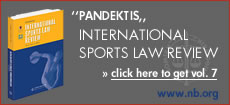Raises and games, Violence & Treatment of Doping, Administrative and Criminal Settings: New Greek Law of Sport
Feb 18 2012 | 12:43 AM
Hellenic Center of Research on Sports Law
Symposium, 2-2-2012
“Raises and games, Violence & Treatment of Doping, Administrative and Criminal Settings: New Greek Law of Sport”
Synopsis
In the event was read greeting by the President of Cultural Affairs of the Hellenic Parliament Mrs Chryssa Arapoglou and attended and also greeted: the Rector of the University of Athens, Prof. Dr. Pelegrinis, who highlighted the importance of Sports Law, not only for the scientific field, but also the practice of Sports and the everyday life of Sports; the President of the Department of Regional Economic Development (on behalf of the President of the University of Athens) Prof. Ch. Botsaris, who referred to the programming of the Department and with Sports Institutions and Sports law courses in the field of "Law and Economics of Sports Law"; on behalf of the Greek Olympic Committee, attended and addressed a greeting the President of Committee of Sporting Spirit, Mr. G. Lenos, who referred to proposals made in Hellenic Parliament by himself, and Professor and President of Hellenic Center of Research on Sports Law (HCRSL), Prof. Dr. Dimitrios P. Panagiotopoulos, who emphasized to the creation of a “Code of Sports jurisdiction” for the proper administration of Spots justice. Also, greetings addressed the President of the Greek Federation of Police, Mr. Chr. Fotopoulos, who praised the role of Police and the heavy burden incurred in the event of violent events, in occasion of athletic events, and expressed the wish that the new Act to help eradicate such problems. In the end, attended and addressed the General Secretary of Sports, Mr. Pan. Bitsaxis, who, among others, stressed that the new Act there is not overall reform effort, but an effort to withstand mainly phenomena of violence in the stadiums at the base revision of the old and adding new provisions relating to clubs and supporters of the movement, the confrontation of doping and raises games, and reconstruction of the respective institutions.
On the First Session of the Symposium, were developed more specific issues of scientific interest, associated with the new settings of law, from the Professor Dr. John Panousis, Professor Dr. G. Delis, Professor Dr. Spiliopoulou and Professor Dr. Panagiotopoulos, made an overview of the provisions of the new law, highlighted the regulatory dolichodromia and confusion of the legislature on these issues (doping-Violence) and in many cases, the inapplicability, He also stressed that several administrative provisions (to deal with violence and the movement of organized racing fans and security) moving in the right direction. In conclusion, however, noted that, «The proposed bill has not, as it should, following the vast experience of the 2004 Olympic Games in our country, reformed the field of Greek athletics. Someone would expect a substantial redefinition and making settings due to new social and economic realities of sports in our country. At least one would expect that we should define the jurisdictional class sports specific organs of justice in an “Athlodikeion” with the specific procedural system, set to a detailed code of sports jurisdiction. The establishment of an independent sports authority would be the "touchstone" of the smooth and effective functioning of the sport, with the inclusion therein of all judicial and independent administrative bodies of sport».
The Second Session developed analytically separate issues with the new law by Asst. Prof. M. Papaloukas for bets and raises and races, from Dr. Hel. Mantratzi to tackle doping with emphasis on the concept of standardization crime and its connection with the provisions of the criminal Procedure and the lawyer Mr. A. Papantoniou who analyzed in depth the problem of gambling and the movement of organized supporters in connection with the new law taking a holistic legislative review and critique. Also, feeling engendered the presentation by the lawyer I. Anagnostopoulos, Candidate Dr., about the problem that occurs with specialist qualifications conferred by the University of Physical Education in Greece since the adoption of No. 1732/2011 decision of the Council of State, which is a formal requirement for a license to practice coaching in Article 31 of Law 2725/99 and which, not surprisingly, caused a large and substantive debate.
In the discussion of these issues the presence of Secretary General of Sports was really important, especially to the discussion of topics of the symposium for the autonomous region of football and the compatibility of the provisions of the new sports law with the regulations of the UEFA / FIFA set by the Dr. in Lausanne and the CAS, Mr. M. Mitzikos lawyer, Candidate Dr.. In this dialogue there was an intervention by Professor Panagiotopoulos, referred to the lack of international legitimacy of Lex Sportiva and its stakeholders regarding the rules of law relating to personal and economic freedoms, public order and health fields as public regulators interest and competence institutions with national or supranational statehood.
The themes that were presented by lawyers Serg. Manarakis, Candidate Dr. and Mrs. Phot. Minaki were also interesting, with questions relating to procedural aspects regarding the resolution of economic disputes. It was stressed that the new arrangements, according to the contents of the revised law, constitute a positive development in the sports law, provided however, that the resolution of issues related to the continuous and uninterrupted operation of the Committees should have been preceded, as there can’t be upgrade of justice when the bodies of the award are missing.
In the context of this event, Professor and President of HCRSL and the International Association of Sports Law (IASL) Professor Panagiotopoulos awarded the statutory award for high figures "Apollo Nomios" to Mr. G. Vardinoyiannis for his contribution to the sports scene and its contribution to the solidification professional sport in our country.
HCRSL Secretariat


